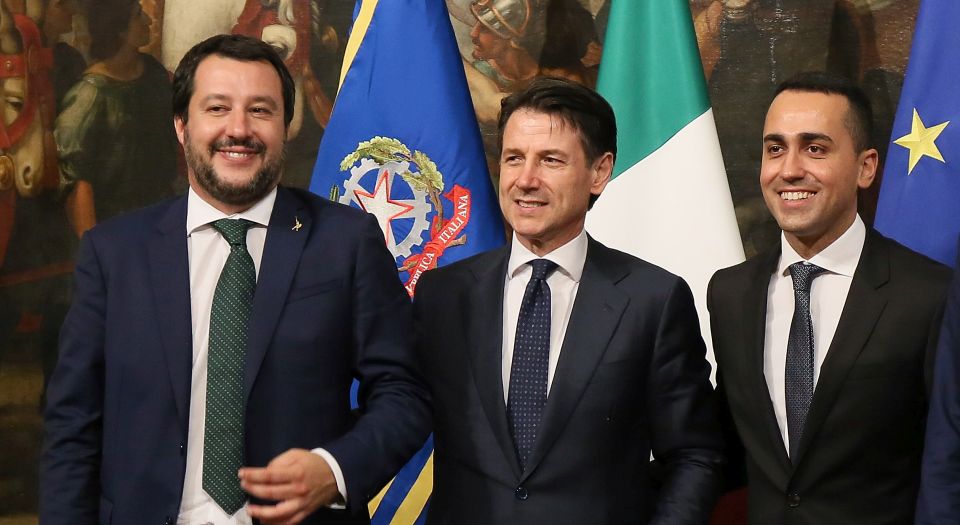Treating Italy like a Euro-colony
The EU’s meddling in Italy should alarm all democrats.

After almost 90 days of protracted negotiations, following the General Election in March, a new Italian government has finally been sworn in. Led by a coalition of the Five Star Movement and the League, it has been labelled the first populist government in Western Europe. The election results certainly expressed a popular desire for change, but will the new government deliver? It seems increasingly unlikely.
Unfortunately, the leaders of the government are far from truly populist. Unelected technocratic ministers hold the top positions in the new administration – including prime minister, foreign minister, defence minister, economy minister, environment minister, culture and tourism minister, and education minister. To have a government led by an unelected law professor who was unknown to most Italians previously – the PM Giuseppe Conte – goes against the cry for democratic change made by many in the election.
The leaders of the Five Star Movement and the League, Luigi Di Maio and Matteo Salvini, are both deputy prime ministers. They also head the ministries of industry and labour (Di Maio) and the interior (Salvini).
The League and, even more so, the Five Star Movement have spent years opposing technocratic appointments in government. Yet when faced with the choice of fresh elections or accepting technocratic ministers who are favourable to the EU, they capitulated. This was most clear in their acceptance of Giovanni Tria, formerly a consultant for the World Bank, as economy minister. This was after Di Maio and Salvini had proposed Paolo Savona, who was rejected by Italian president Sergio Mattarella. (Savona was later appointed to the less important role of minister for European affairs.)
President Mattarella’s office took the unusual step of publishing, in English, an explanation of why he rejected Savona as economy minister. The statement says Savona is ‘a representative who… could probably, or even inevitably, provoke Italy’s exit from the Euro’. As spiked’s editor Brendan O’Neill correctly pointed out, vetoing a candidate for a ministerial role over a conflict of interest is legitimate, but blocking him for his perceived opinion is not.
President Mattarella said he couldn’t accept Savona as economy minister due to the ‘the rising spread’, which ‘day after day, increases our public debt’. ‘Uncertainty over our position on the Euro has raised alarm among investors and savers, Italian and foreign, who have invested in our government bonds and in our companies’, he said.
‘The spread’ refers to the gap in debt yields between Italian and German bonds. This spread on Italy’s 10-year bond spiralled, in points, from 122.256 at the start of May to 287.123 by the end of May.
Yet the Financial Times revealed that the increased spread in May was the outcome of intervention by the European Central Bank. In May, ECB officials reduced their purchasing of Italian debt while buying more German debt, increasing the spread on debt yields between the two nations. This has led to ‘suspicion among some analysts that officials skewed purchases away from Italy to punish a prospective Eurosceptic government’, says one report.
The ECB dismissed such criticisms. And yet the ECB has acted in a similar fashion with previous Italian governments. It overbought Italian bonds when the then pro-EU prime minister Matteo Renzi was facing political pressure in a referendum in 2016. And the ECB refused to intervene to buy Italian bonds when the government led by Silvio Berlusconi fell out of European favour in 2011. This increased the debt yield spread between Italy and Germany and undermined the Berlusconi government: it subsequently lost a confidence vote in Italy’s lower house of parliament in November 2011.
Prior to this, in the summer of 2011, former European Commission president Romano Prodi and then Italian president Giorgio Napolitano met with ex-EC commissioner Mario Monti and suggested Monti should become Italy’s prime minister should Berlusconi find himself forced out. This, of course, is what eventually happened. And it was only after the Monti government proved it could implement an austerity budget that the ECB began intervening to buy Italian bonds, in summer 2012.
Since then, the ECB has become the biggest player in the Italian bond market. It determines prices. And who was the technocratic European affairs minister in the Monti government who oversaw relations between that government and EU institutions? Enzo Moavero Milanesi, who had spent 20 years at the European Commission – and who has now been appointed as foreign minister in the new, supposedly ‘populist’ government.
Relations between EU institutions and the new government will be incredibly important and could restrict the government’s ability to implement its policy contract. For instance, the government has pledged to introduce dual tax rates of 15 and 20 per cent. Some analysts argue that such government spending plans would ‘torpedo the currency union’s fiscal limits’, which include restricting the budget deficit to three per cent of GDP. So already the tax pledge is being pushed back. League senator Armando Siri insisted on Monday that the government’s proposed flat rate will be introduced for both households and businesses next year – and ‘then it will be fully in force in 2020’.
It remains to be seen, however, if the government will last that long. This coalition has a slim majority in the Senate. And its technocratic ministers and the various constraints imposed by EU institutions will no doubt pressure the government to water down its election pledges on immigration, Russian sanctions, infrastructure, spending, and EU rules. Might Euro-institutions once again use their power to push aside popular Italian parties they don’t like?
Dominic Standish is the author of Venice in Environmental Peril? Myth and Reality. Visit his website here.
Picture by: Getty Images.
To enquire about republishing spiked’s content, a right to reply or to request a correction, please contact the managing editor, Viv Regan.








Comments
Want to join the conversation?
Only spiked supporters and patrons, who donate regularly to us, can comment on our articles.